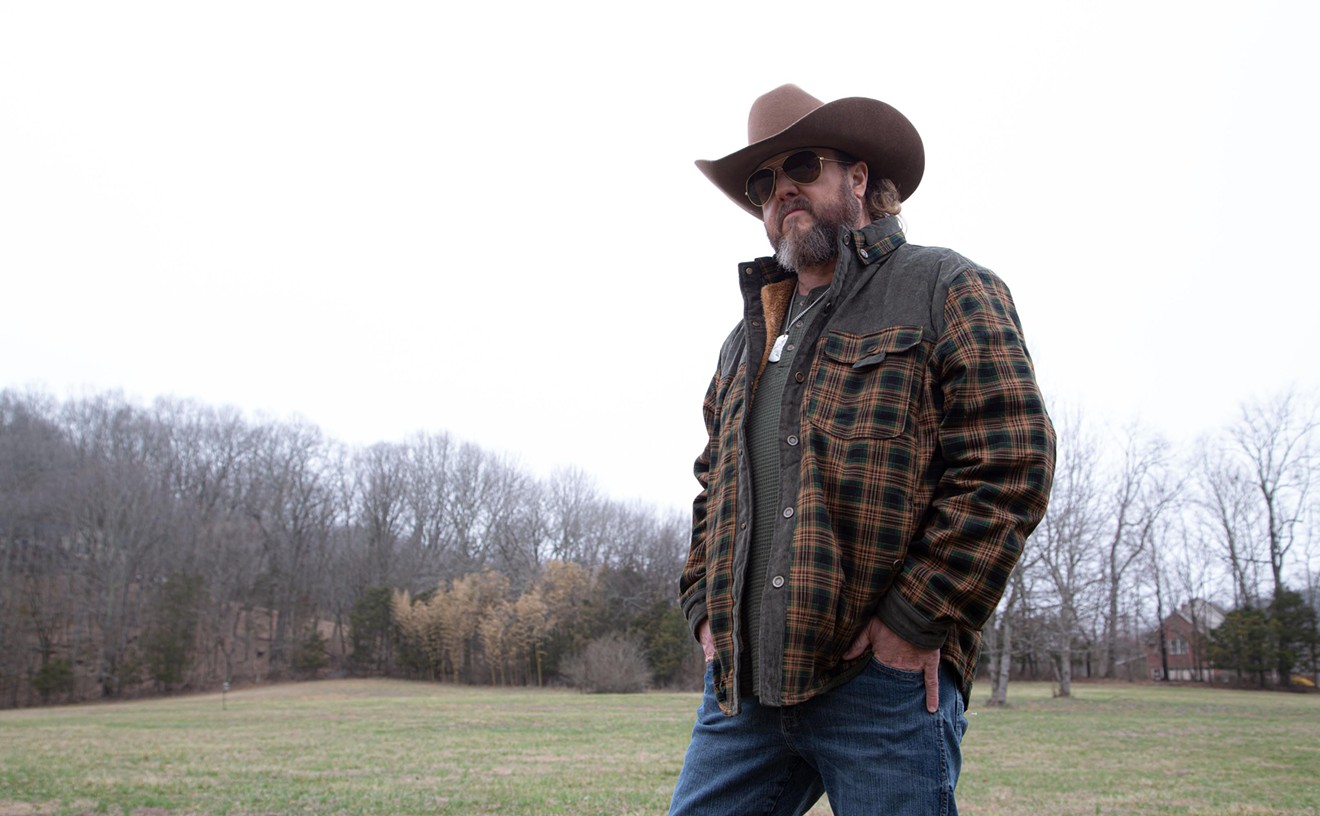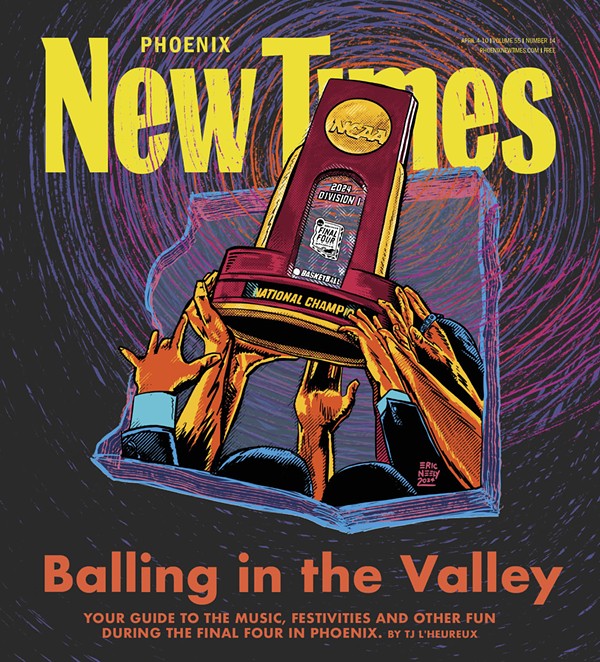UPDATE, 10-29-15 at 11:45 a.m.: Maynard James Keenan has responded to the media attention generated by this story. He also posted a picture of him and Tool drummer Danny Carey.
No, Maynard James Keenan doesn't want to talk about the next Tool album.
Keenan is a bona fide rock star. He's as undisputed as Floyd Mayweather. But that's not to say he's a diva. He arrives at a photo shoot at Four Eight Wineworks in Clarkdale 10 minutes early, pushing the door open and barreling inside clutching a boxy leather briefcase in one hand. His head down, he makes a beeline for the back office. He emerges a few moments later, dressed to impress. He's wearing a dark-blue suit with blood-red pinstripes over a burgundy dress shirt, and a diagonally striped blue-and-red tie hangs over his chest. His mahogany dress shoes don't just look freshly polished; they look brand new. Even his socks fit the theme — they too are the same blue and red as his jacket and pants. He checks in with his employees while the preparations for the shoot finish.
For a man with such a monstrous singing voice, he speaks very quietly. Best known as the lead singer of Tool, one of the most successful and important rock bands of the past 25 years, he also has two other groups: A Perfect Circle and Puscifer, though it would be misleading to call either a side project.
Tool, to the chagrin of its infamously fanatical followers, hasn't released an album since 2006. A Perfect Circle last released an album in 2004, and that hardly counted — it was an album of mostly covers. But Puscifer has bucked the snail's pace associated with Keenan's other projects. The band has released two albums and four EPs since 2007 and is gearing up to release its third, Money Shot, on October 30.
Once the lights are ready, he goes into the back office once again and re-emerges wearing what he calls his "merkin." Technically, merkins are pubic-hair wigs worn by prostitutes of yore who shaved to stave off lice and crabs but who wanted to maintain the appearance of a healthful bush. In this case, it's Keenan's trademark toupée, a mangy Mohawk that adds a dash of humor to his otherwise GQ-approved outfit.
As the shutter starts snapping and the subsequent banter ensues, holding a shovel like a baseball bat, he quietly asks the photographer if he has a lens that will make him look like Johnny Depp. He laughs.
It's been almost an hour, and it's the first time he's cracked a smile.
Maynard James Keenan has a reputation for avoiding the spotlight.
It's only partially accurate. After all, as a frontman whose job requires he perform before of tens of thousands of people dozens of nights each year, he repeatedly finds himself the center of attention. In reality, Keenan really only hates talking about Tool.
The impression that he's angrily aloof probably stems from the fact that as Los Angeles-based Tool rose to a star-studded echelon in the music industry, Keenan notoriously would perform from the side of the stage, hidden in the background, as his bandmates occupied the stage space normally reserved for the lead singer.
Keenan very much dislikes interview questions about Tool these days partially because lawsuits and a nondisclosure agreement have prevented him from fully addressing the band's long-delayed follow-up to 2006's 10,000 Days. It probably didn't help also that in 1995, he ditched L.A. for northern Arizona, and he's lived in the Verde Valley ever since. But as much as Keenan might have wished to lay low, in his 20 years as an Arizonan, he has left his imprint on the area he calls home.
Only about 500 people live in Jerome, a former copper-mining town nestled into the Black Hills. The town stacks on a series of switchback roads, with a small central space offering a "haunted" hotel and typical mountain-town fare, like candy stores and souvenir shops hawking colorful stones and shot glasses. But on any given weekend, and even some weekdays, the two blocks or so that could be considered Jerome's "downtown" bustle with tourists. The main attraction isn't just quaint mountain kitsch but wine. The Verde Valley has a burgeoning wine industry, and Keenan's fingerprints are everywhere.
Spend a weekend wine-tasting there and it seems every brand-new winery is either owned or staffed by former employees of one of Keenan's various wine properties. Two prominently placed stores in old-town Jerome bear the fruits of Keenan's labor. The first is Puscifer the Store, a spacious gift shop selling all sorts of Puscifer-branded merchandise, from T-shirts to signed albums to jewelry shaped in the band's logo. There are even a few hairdressers operating in the shop's downstairs level, coyly named "Barbifer." Just down the street is Caduceus Cellars, a tasting room filled with racks of bottles where wine and music lovers alike gather to taste $14 flights of Keenan's wine.
On a recent Saturday evening, two Caduceus wine experts field questions from wine drinkers and pour tiny tasters of the current stock. Keenan's celebrity is milked for maximum effect. Digital picture frames display a slideshow of photos of the wine-making process, many starring the owner. Puscifer's second album, Conditions of My Parole, plays in the background. Keenan's music doesn't make up the entirety of the playlist, which an employee behind the counter says the boss curated himself, but it's still very present.
Employees used to be able to play their own music, until Keenan walked in once and heard a Robin Thicke song playing over the speakers. He banned all other iPods but his on the spot.
It's a fairly busy night, and when prompted, an employee conducts an informal survey by shouting over the din — how many people in the tasting room have seen a Tool concert? People turn their heads, and most raise their hands. Ten of the 16 customers had seen Tool perform, and two more had seen A Perfect Circle. Keenan might be focused on wine these days, but it's his music that keeps drawing people into his world. Though he spends most of his time absorbed with the day-to-day tasks of viniculture, his reputation as an artist precedes him.
And it won't leave him alone.
Keenan is 51. He planted his first vines in 2002, and since then, his musical life has orbited around his wine making.
However, just as grape harvest ends, it's time for Keenan to shift back into musical mode. Arizona is a good place to be a Maynard aficionado, to adopt the first-name familiarity the hardcore fans use. In June, Tool announced it would play its only show in 2015 on Halloween at Tempe Beach Park, as part of Lucky Man Concerts' Monster Mash Music Festival.
In July, Puscifer announced it would release Money Shot on October 30. Soon after, the band joined the Monster Mash lineup, scheduled to play two days later, November 1. Part of Tool's reputation and enormous success (Grammys, four platinum albums, sold-out shows for decades) stems from a fanatical devotion from the band's followers, who have chopped Tool's infamously limited output, which reaches back to 1992, into bits and analyzed the tiny, at times unrecognizable, pieces.
But with that devotion can come a sense of entitlement.
There are some who blame Keenan's time-consuming wine ventures and forays with other bands as the reason for the lack of a Tool album. But as New Times learned from Keenan on a hot morning in Clarkdale, there no longer is any separation between the wine and the music. Maynard seems to approach wine and music in a similar way. Maynard the vintner is Maynard the musician, and vice-versa.
The photo shoot ends, and Keenan begins to talk about Money Shot. Except the conversation doesn't go there right away. Turns out, it's almost impossible to talk to Keenan about music without the topics of location and wine fermenting their way to the surface. For Keenan, wine making and music are two spirals on the same corkscrew.
"There's always a puzzle, then there's always a desire to solve the puzzle, whatever the puzzle might be," Keenan says. "If it's a rhythm, how are we going to put these melodies on that rhythm? If it's a melody, how are we going to put the rhythms on that melody? How do we tell the story around this thing? How do we make people believe that vines grow in the desert? It's the same approach. Just solving puzzles."
Four Eight Wineworks is housed in a turn-of-the-century bank building in Clarkdale. When Keenan re-fitted the building to its current state, he kept many of the old touches. The original teller windows line one side of the wall, with wine bottles where there would have been deposit slips. What once was the bank's vault now houses shelves filled with merchandise from Keenan's and others' wineries.
Some artifacts from the nearby museum sit in a glass display case, telling the story of a 1928 bank robbery in that very building. Two robbers attempted to abscond with the United Verde Copper Company's payroll, and in an ensuing gunfight, an innocent bystander named Lee Snider took a bullet to the hip. In the display case is Snider's dented pocket watch, whose fortunate placement in his pocket likely saved his life.
Keenan has obvious pride in the building's history.
"There's a lot of effort in the structure of these things that nobody even quite gets," he says. "Everybody lives in cardboard boxes now. They're like matches waiting to go up. These things don't burn. This is like a fucking rock . . . there's some foundation to this thing. Most places nowadays, neighbors can hear each other thinking."
Money Shot is a true reflection of Keenan's life in Arizona, he says. It's also the band operating at peak efficiency. It's a more focused, perhaps introspective, album than anything Puscifer previously has released. Gone are the absurd joke songs like "Cuntry Boner" in favor of the somber storytelling of "Simultaneous" and the muted rage of the title track. Not to say the album is devoid of humor — it's hard not to laugh when Keenan repeatedly shouts "What's the matter Beavis?" on "The Arsonist."
"The first album, I feel, was kind of schizophrenic, just because we were all over the place writing it," Keenan says. "We were in almost every town in the U.S. traveling on the road, trying to jump into studios on days off, recording in the bus, in dressing rooms, on show days. So it really just kind of captured that — all over the map. But our signature was starting to shine through.
"The second record was a little more about where we were recording it, and I think that this one was more about me in that place. Not just about the place, but also about my role in that place ... Jerome, Arizona."
Puscifer might be Keenan's newest band, but it has roots that stretch back to 1995, when a joke band called Puscifer made a brief cameo on the first episode of HBO comedy series Mr. Show. A decade later, Keenan met multi-instrumentalist Mat Mitchell, who was the guitar tech for A Perfect Circle's Billy Howerdel at the time. The two started composing music together, and the first Puscifer full-length album, V Is for Vagina, came out in 2007.
Since then, the creative process slowly has opened up to include singer Carina Round, whose vocals add a delicate feminine dimension to the music. On Money Shot, Round played a much bigger role earlier in the songwriting process, and she, Mitchell, and Keenan share songwriting credits on nine of the album's 10 songs.
"Since I have three bands, having that extra element of [female] vocals helps separate it from the other projects," Keenan says. "Historically, the Puscifer records have had a lot of harmonies, even if they're all me. I feel like having her voice in there really helps give it that separate dimension."
The songs began their infancy as an exchange of ideas between Mitchell and Keenan. Keenan would throw rough ideas at Mitchell, who then created something for Keenan to sing over. The two would go back and forth, and once they had a foundation of a song, they'd send it off to Round, who would record vocals.
"I give [Mitchell] a lot of ideas," Keenan says. "I'll point out books, movies, songs, albums. I'll just give him broad strokes, moods basically. Just give him a wide-open thing and then, 'Give it about this tempo.' He'll come back with some rhythms. If they're going in the direction I was hoping with whatever seeds I was planting with him, then great. If he ended up coming up with something he didn't even expect, then we just continue down that road."
From Round's perspective, "Puscifer is Maynard and Matt's working relationship evolving. I feel like Matt and Maynard are two different sides of one brain . . . I think they need each other, too. It's a beautiful little brotherhood going on."
When Round, a singer-songwriter on her own, joined the band, she had to adjust to the free-form way Mitchell and Keenan compose music. Not to mention, she had to figure out how to connect with Keenan.
"He was pretty closed off at first. It took a while to get used to that," Round says. "More than anything, it was just exciting to just be able to sit in on that process . . . It was like a tornado in a way. There's a certain sense of urgency. There's this spinning-plates energy that keeps things very fresh."
This time around, Round was a vet at navigating Mitchell and Keenan's process. She felt unleashed, and the album reflects that. Her vocals feel more integrated into the songs, her voice springing from the foundation organically and symbiotically intertwining with Keenan's.
"There were moments [recording this album] that we'd never really had before, where [Keenan] and I could work together on how the end result of the song would really work," Round says. "I think we just developed a certain amount of trust . . . He provided me a lot of freedom to go do whatever I wanted."
Electronic bleeps and bloops mingle with atmospheric, introspective guitar-bass interplay throughout the album. Round says it sounds like the soundtrack for an "alien spaghetti western." That's intentional to a degree, Mitchell says. It's a result of spending time in Arizona.
"When you're up in Jerome or when you go down to some of the vineyards and stuff, it's beautiful nature. It's gonna seep in when you're writing stuff," Mitchell says. "I've also always appreciated spaghetti western stuff, a lot of that music is naturally the soundtrack for those kind of landscapes."
Some of what gives Puscifer its identity as a band is the incorporation of electronica sounds into Keenan's trademark bass-heavy, aggressive rock. That trend continues on Money Shot. It seems counter-intuitive that the band would use electronic elements in the music, given Keenan's unique relationship to the earth. But he sees no contradiction. Having electronic components in music is as natural as using a clock to tell time, he says. He compares traditional rockist opposition to electronic music to the art world's reaction to photography.
"People would argue that photography is not an art form because the camera just does it for you. How could that be an art form? But there's a human interaction to that," Keenan says. "Well, it's how the human is interacting with the inanimate object. It's always been that way, you know? The chisel is the chisel . . . You're using the chisel to move the rock around. But it's the human interaction part that's the art."
Puscifer isn't just a band. It's an entire stage show, complete with comedy and video animation designed by Puscifer regulars Meats Meier, Tim Cadiente, Mike King, and Laura Milligan. Keenan gives similar direction to his video artists as he does to Mitchell — just the broad strokes.
"That way I can just enjoy the videos rather than being victimized by the process," he says.
Does he ever feel victimized by the process when making music?
"Oh, yeah," he says, pausing. "We'll leave it at that."
Lots of bands in the '90s went platinum.
Tool, Keenan's first major band, is not unique in that context. What makes Tool different is the fans.
Not every band spawns such an intense following. Passionate and dedicated, Tool fans were some of the earliest adopters to message-board culture, and debates over the minutiae of Tool songs and the grand meaning of it all have been synonymous with Tool fandom since the beginning.
Part of what inspired the fan base comes from the band itself. Keenan's lyrics in the Tool days referenced people like Carl Jung and late comedian Bill Hicks equally, and the band released cryptic music videos and commissioned visionary artist Alex Grey to design album covers.
The almost 10-minute song "Lateralus" almost certainly is composed around the Fibonacci sequence, a feat that fans blasted to the world as evidence of the band's unchallenged genius. Danny Carey (considered one of the best drummers of his era) employed a sort of mystical math to set up his drum kit. The band even created a fake philosophy, lachrymology, and made references to it during the early days.
Though the band released its first EP in 1992, it wasn't a grunge band.
The music contained complex time signatures, but it wasn't a prog rock band, either. Tool often gets lumped into the nu-metal genre. That's an insult; it's almost impossible to be taken seriously as a music listener if you like nu-metal. But even though the band experienced its biggest commercial successes during the heyday of Korn and Limp Bizkit, it doesn't fit in that ilk, either.
Like Primus (a band whose drummer, Tim Alexander, appears on many Puscifer recordings), Tool stands alone, spawning imitators galore but lacking a direct, traceable path back to its influences.
However, Tool isn't without detractors. The fan base has been widely derided as rabid, obsessive, and even a bit naive, falling for the band's faux-mysticism like a Bernie Madoff client. The band's massive following spawned an inevitable backlash from turn-of-the-21st-century hipsters.
Pitchfork gave Tool's 2001 album, Lateralus, considered by many to be its best work, a 1.9. Writer Brent DiCrescenzo wrote the review from the perspective of a 16-year-old obsessive Tool fan, mocking the album's strengths with lines like: "It's the best Tool record because it's the longest" and "over the summer, I counted the number of tom hits in ['Ticks and Leeches'], and it's 1,023!! Amazing."
You got the feeling that Tool was pulling a giant joke on its fan base, and the fans were none the wiser. After all, Tool's name is a dick joke. If you don't believe it, just look at its logo — a suspiciously phallic wrench emblazoned with its name that was plastered on countless thousands of T-shirts and hoodies during the band's heyday. Lachrymology was obviously a joke, but that didn't stop breathless analysis and fan theories from populating (or perhaps polluting) Internet message boards.
Even today, fans can't stop over-analyzing Tool. "Ticks and Leeches" is about the sycophants and bloodsuckers who attach themselves to people once they get famous, or perhaps it's about the parasitic music industry, to paraphrase NOFX. Here's a comment someone made a month ago on the "Ticks and Leeches" entry on the lyric analysis website Genius: "I think it may be about psychic vampires draining people through passive aggression."
See, Tool fans are deathly serious. Tool as a band really isn't, at least not all the time. The song "Hooker With a Penis" is a direct response to a fan accusing the band of selling out. Keenan's lyrics are frank in response. "All you know about me is what I've sold you, dumb fuck / I sold out long before you ever heard my name / I sold my soul to make a record, dip shit, and you bought one." The song ends with Keenan screaming "Buy my record / Send more money / Fuck you, buddy."
The album Ænima contains a song called "Intermission," which is literally just 90 seconds of the theme from the following song, "Jimmy," reinterpreted as elevator music. Another song on Ænima, "Die Eier Von Satan," is a recipe for hash cookies spoken in German over a sinister industrial beat and a cheering crowd. Hell, the whole album is dedicated to Hicks, whom Tool members saw as a kindred spirit.
No one should be surprised to hear a band called Tool making dick jokes. But there's an unreleased song called "Maynard's Dick," in which Keenan invites the listener to "slide a mile six inches at a time."
One of the many roles Puscifer has served is that it functions as an outlet for Keenan's sense of humor. The entire band's existence should be a sign that Keenan is having fun making art. The cover art for Conditions of My Parole, Puscifer's second album, features Keenan as a redneck con with a blond mullet and an orange jumpsuit.
It's also an avenue for Keenan to explore alternative sides of his artistic expression.
"I experiment with all these places I've been," he says, testily. "I'm experimenting with grapes in Arizona, I mean, come on. Everything's an experiment. But I feel Puscifer has more breadth . . . We can do animation, film, music, scores."
You'd think Keenan hates Tool. In fact, his reputation as a recluse comes largely from his stubborn refusal to answer questions about Tool, including the undying question: "When's the next Tool album coming out?" New Times pointed out to him that he seems freer to express his less serious side in Puscifer, as critics and fans tend to view his other projects more seriously.
"It's weird. It shouldn't be," Keenan says. "I mean, this one's named dick, this one's named vagina. That's the start there, okay?"
He acknowledges that there was indeed humor in the Tool albums. But as with any time he's asked about Tool, his answers quickly become curt. A hint of exasperation creeps into his voice and he exhales heavily through his nose.
"Yeah, it's there," he says. "But people miss it because they're so focused on the other bullshit."
He shakes his head.
"It's lost. Insufferable people . . . It's just ridiculous, retards. I'm sorry. Can't help them. Way too serious. Too much. Lighten up."
Did he have to corral the other band members to play this one show in 2015?
"No, they had to con me into it."
Deftones is also playing the festival. Are we going to hear "Passenger," the Deftones song featuring Keenan guesting on vocals? Keenan hasn't performed it live in more than a decade.
He shakes his head vigorously.
Then the million-dollar question: When's the next Tool album coming out?
"There's nothing to say," he says. "I can't."
There are grumblings that Tool's not releasing an album since 2006 results from Keenan's indifference/frustration/disgust with the band and its followers. But soul-sucking lawsuits have a lot to do with it, too.
In 2007, artist Cam De Leon sued Tool for copyright infringement. De Leon had created several pieces of art, including Tool's iconic wrench logo, for the band but claimed ownership of the copyright. The band had purchased an insurance policy that should have protected it from the original lawsuit, but the insurance company turned around and sued the band instead.
"We bought an insurance policy for peace of mind, but instead we would have been better off if we never had it and just dealt with the original lawsuit," Tool guitarist Adam Jones told Rolling Stone in 2014. Jones also noted what a creative drag it was on the band to have to deal with the litigation.
"I find it so hard to be creative when you have something awful nagging at you, just stuck between the hemispheres of your brain and affecting your sleep and your relationship with other band members . . . It's like we've been in a war."
In March, the band announced it had settled the lawsuits and work could continue on the next album. But there are complications.
Jones told Yahoo News that one of the band members is dealing with a serious illness in the family. Keenan is about to tour with Puscifer and otherwise is occupied with remaking the Arizona wine scene in his image. Drummer Danny Carey is in a lot of side bands, and bassist Justin Chancellor hasn't made many public appearances recently.
Say these distractions resolve themselves. Can Tool fans expect a new album anytime soon from a band with four members approaching or in their 50s, one of whom is Maynard James Keenan?
You're more likely to swim in Arizona Bay.











